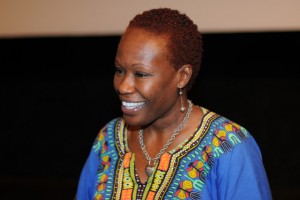Ulysse Writes Tribute to Anthropologist Karen McCarthy Brown

Gina Athena Ulysse, associate professor of anthropology, wrote a tribute on the Tikkun Daily Blog to Karen McCarthy Brown, professor emerita of anthropology and sociology of religion at Drew University, who passed away earlier this month.
“Reading Karen’s Mama Lola kept me in grad school. Vodou got a human face from her,” Ulysses posted on Facebook after hearing news of Brown’s death.
She goes on to explain, “Mama Lola was published by the University of California Press in 1991. Based on extensive fieldwork conducted over a decade, Brown became an initiate of her subject, as a condition to deeper research and writing her life history. The resulting ethnography with its radical crossings blurred methodological and scriptive lines. Brown took creative liberties fictionalizing various strands of Lola’s familial and spiritual genealogies.”
Though highly celebrated, the book was not without its critics. Haitian anthropologist Michel-Ralph Trouillot questioned tensions between Brown’s ethnographic authority and totalizing narrative.
Ulysses writes, “Indeed, in many ways, Mama Lola was something of an insider ethnography. In retrospect, I formed an attachment to it precisely because I had some knowledge to discern fact from fiction, to fill in the silences and to decipher practices layered in an opacity that was part of a historically damaging trope. Simultaneously, it expanded my lexicon as I learned so much about religious practices in my birth country that to this day remain trapped in obscurity, familial and otherwise. In that sense, the book had done for me exactly what anthropology is supposed to do, make the familiar strange and the strange familiar. It also sensitized me to the restrictions of genres, fieldwork dynamics and negotiations among so many other things. I knew there would never be an ethnography of my family’s story. Performance, maybe? Memoir, definitely. Some stories are not mine to tell.”

